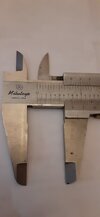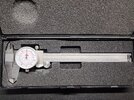eddiememphis
Member
Be careful with feeler gauges. Most I have seen are nowhere close to accurate.If you are only reloading and not building a gun, calipers are all you need. As stated above, dials don't have batteries to go bad, but digital does offer certain conveniences.
As far as calibration, I have 2 sets of feeler gauges. Wipe them clean and the "jaws" of the caliper before measuring. My gauges and calipers are in sync with each other. I have a 1" mic to measure case head expansion, but my free plastic calipers from a distributor 10 yrs ago, at work, and my Harbor Freight digital reads the same as my mic.
So, for me, and my reloading measurements, a set of calipers is all I need. Take a set of feeler gauges with you when you go shopping.
Unless you spend $70 or more for a machinist quality set, the junk you buy at the auto parts store is just that- junk.




